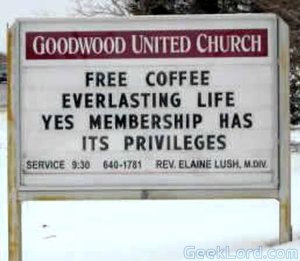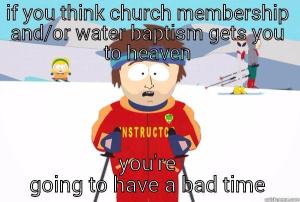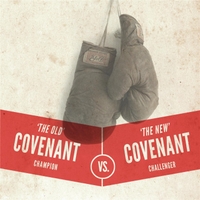Blog Archives
IS CHURCH MEMBERSHIP BIBLICAL? (2 of 5)
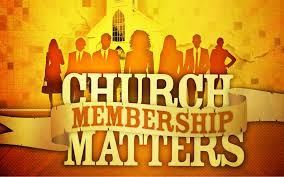
Who’s your Shepherd
Spiritual friends here in Utah believe strongly in an individual’s need, no—requirement, for church leadership—a prophet, president, pope, priest, or pastor. However, such dependence upon people to enhance, and even direct our relationship with God is actually the reason Protestantism began! We warn Catholics, Mormons, and others to not put the word of man before the Word of God, yet commit the same deed when our denominations demand dedication to their dogmas.
Paul’s Example
After Jesus’ resurrection, James, the brother of Jesus, and Peter, the “Rock,” rose to become leaders of the church in Jerusalem. After an argument between Jewish and Gentile believers sparked division, the Jewish leaders of the church wrote a letter to the Gentiles and commanded Paul and Barnabas to carry their message to the churches of the land. In the letter, James and Peter—the SHEPHERDs of the Church—wrote, “it seemed good to the Holy Spirit, and to us, to lay upon you no greater burden than these necessary things: that you abstain from idols…” (Acts 15.28-29). Barnabas and Paul took this letter and obediently spread it to the Gentile world… right?
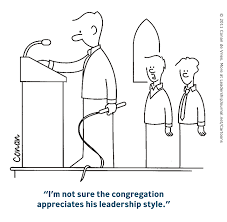 Paul, the apostle who wrote much of the New Testament, told the Corinthians, “Now concerning things offered to idols: We know that all have knowledge. Knowledge puffs up…. We know that an idol is nothing… However, there is not in everyone that knowledge… their conscience, being weak, is defiled [when they eat] but food does not commend [nor condemn] us to God” (1Cor 8.1-8). In other words, Paul said they can eat food sacrificed to idols, but shouldn’t because it is offensive to Jewish Christians with weak minds, like James and Peter, the leaders of the Church.
Paul, the apostle who wrote much of the New Testament, told the Corinthians, “Now concerning things offered to idols: We know that all have knowledge. Knowledge puffs up…. We know that an idol is nothing… However, there is not in everyone that knowledge… their conscience, being weak, is defiled [when they eat] but food does not commend [nor condemn] us to God” (1Cor 8.1-8). In other words, Paul said they can eat food sacrificed to idols, but shouldn’t because it is offensive to Jewish Christians with weak minds, like James and Peter, the leaders of the Church.
Paul also publicly rebuked Peter for hypocrisy when he avoided Gentile Christians and favored those of his same “denomination” (Gal 2.11-14). Paul even writes concerning the “shepherds” of the Church that they “seemed to be pillars,” yet he was not compelled to obey them, nor depend upon them for spiritual guidance. Paul states, “When it pleased God… to reveal His Son in me… I did not immediately confer with flesh and blood, nor did I go up to [the church] to those who were [leaders] before me… [because] the gospel which was preached by me is not according to man. For I neither received it from man, nor was I taught it, but it came through the revelation of Jesus Christ” (Gal 2.15-17; 1.11-12).
In other words, Paul’s gospel was not dependent upon the preaching of those who came before him. He says, “Follow me as I follow the example of Christ” (1Cor 11.1) reminding us that a relationship with Jesus is INDEPENDENT of any other man or woman. We follow others only as they help us follow Jesus, not in place of our Lord.

Jesus is our New Covenant Shepherd
Like Paul, we have one mediator, one Shepherd, and one Lord (1Pt 2.25; John 10), but we also have elders, pastors, and deacons commanded by God to “act as shepherds” to those who are members of God’s Church (1Pt 5.2; Act 20.28). However, like Paul, our relationship with Jesus is NOT dependent upon our “submission” to those elders, pastors, or deacons; rather they enhance our relationship only when ALL are practicing new covenant Christianity.
The question we must ask about church membership is this: Does it unite me with Christ or to those who speak for Him?
IS CHURCH MEMBERSHIP BIBLICAL? (1 of 5)
One of my “pet peeves” about congregational gatherings is the dogmatic push for church membership. Maybe it’s because I spiritually “grew up” in parachurch groups and military chapel systems where membership was implied through consistent attendance and not complicit acceptance of denominational doctrine. Sure, I understand that church membership is of great logistical importance to modern congregations and that for some, belonging to a fellowship necessitates formalities. However, when church membership becomes a requirement it mutates into something more than a mere convenience.
What is “Church?”
We all know that “Church” is not a where, but a whom; not an edifice but an edifying body of believers building one another up in Christ. All Christians also understand that we belong to the universal body of Christ not when we sign a paper, but because we are adopted as His sons and daughters through the indwelling of His Spirit (Gal 4.6). So why do some believe a pledge of allegiance to an organization is required?
An article on gospelcoalition.org about the requirement for church membership stated, “being a part of the universal church without submitting to a local church is not possible, biblical, or healthy…. Every letter in the New Testament assumes Christians are members of local churches…. Independence—the desire to choose for yourself what’s right and wrong—is at the heart of sin. You need the humility lesson of submitting to flawed elders” (http://www.thegospelcoalition.org/article/is-church-membership-really-required).
Old or New Covenant?
Most Christians define “church” similar to what the Gospel Coalition and other denominational organizations do: a local congregation led by an ordained elder or pastor, meeting in a sanctified edifice, and consisting of a laity who gives and serves separate from a clergy who shepherds and preaches. This construct is what the Bible calls “the old covenant” with the expectation that anyone who is following Jesus will comprehend, adhere to, and inevitably become a member of the new covenant.
The old covenant requires our dependence upon an appointed, ordained, and educated priest, prophet, pope, or pastor. The new covenant states, “none of them shall teach his neighbor, and none his brother” (Heb 8.10) imploring us ALL to mature to teachers, not babies dependent upon the milk of others’ knowledge (Heb 5.11-14).
The old covenant “had ordinances of divine service and the earthly sanctuary” (Heb 9.1) requiring “church” to be housed in a sanctified facility. The new covenant says “for where two or three come together in my name,” there is Church—whether where we come together is a home, a restaurant, or a park (Mt 18.20). Old covenant church is a where and when; new covenant is who and why.
The old covenant requires the priest to complete a duty dissimilar to the laity. The new covenant teaches that we are all priests (1Pt 2.9), called to ministry (2Cor 5.17-20), and required to do “our part” as a member of Christ’s Body (Eph 4.16).
Therefore, the question we must ask is this: are you becoming a member of the old or new covenant?



